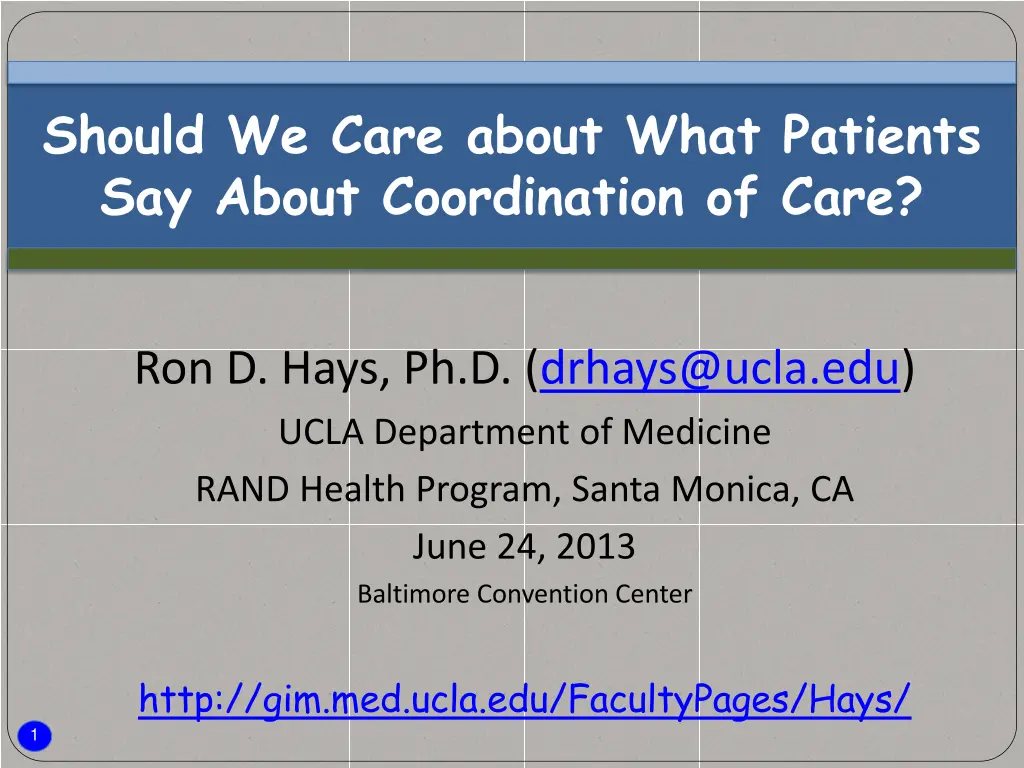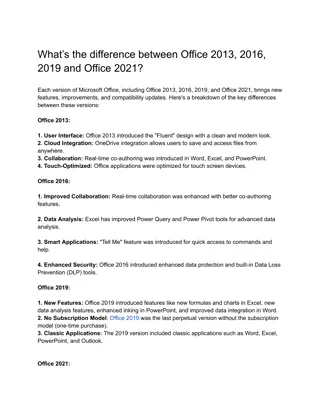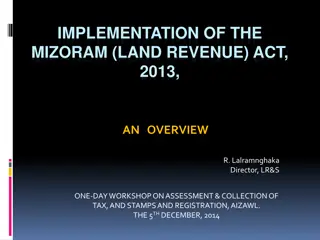
Understanding the Importance of Patient Feedback on Care Coordination
Patient feedback plays a crucial role in assessing the coordination of care. This article explores various studies and reports that highlight the significance of patient-reported measures in evaluating the quality of care coordination and its impact on patient outcomes. The discussion covers the development of care coordination measures, the relationship between patient satisfaction and healthcare utilization, the role of technical quality of care, and the insights provided by Consumer Assessment of Healthcare Providers and Systems (CAHPS) surveys.
Download Presentation

Please find below an Image/Link to download the presentation.
The content on the website is provided AS IS for your information and personal use only. It may not be sold, licensed, or shared on other websites without obtaining consent from the author. If you encounter any issues during the download, it is possible that the publisher has removed the file from their server.
You are allowed to download the files provided on this website for personal or commercial use, subject to the condition that they are used lawfully. All files are the property of their respective owners.
The content on the website is provided AS IS for your information and personal use only. It may not be sold, licensed, or shared on other websites without obtaining consent from the author.
E N D
Presentation Transcript
Should We Care about What Patients Say About Coordination of Care? Ron D. Hays, Ph.D. (drhays@ucla.edu) UCLA Department of Medicine RAND Health Program, Santa Monica, CA June 24, 2013 Baltimore Convention Center http://gim.med.ucla.edu/FacultyPages/Hays/ 1
Development of a Care Coordination Measure for the CAHPS Medicare Survey Steven Martino, Julie A. Brown, Mike Cui, Paul Cleary, Sarah Gaillot, and Marc Elliott 2012 CAHPS Medicare Survey Supported by CMS contract HHSM-500-2005-000281 Agency for Healthcare Research and Quality cooperative agreement (U18 HS016980) 2
Patient-Reported Measures are Important (not the only) Indicators of Quality of Care Technical Reports Quality of Care Behavior Health Clinical Reports 3
Despite the Well Known Fact that Correlation is not Causality 4
One Might Be Tempted to Conclude that Patients Can Be Satisfied to Death Fenton et al. 2012 Archives of Internal Medicine (MEPS) 4 items from CAHPS communication composite 0-10 global rating of health care More positive assessment of care associated with: Less emergency department use Higher inpatient use and drug expenditures Higher mortality 5 5
And Good Technical Quality of Care Is Bad for Health Change in SF-12 PCS regressed on process of care aggregate Process of care PCS Hypothesized positive effect, but the unstandardized regression coefficient was NOT SIGNIFICANT beta = -1.41, p =.188 Kahn et al. (2007), Health Services Research, Article of the Year 6
Consumer Assessment of Healthcare Providers and Systems (CAHPS) What patients want to know and know best Reports about actual experiences Communication Access Customer Service Supplemented by global rating items 7 7
Care Coordination Items Personal doctor: 1. has medical records or other information about your care during visits 2. talks about all medicines you are taking 3. informed and up-to-date about care from specialists 4. helps manage care from providers and services 5. follows up on test results 8
Data Collection Random sample of 2012 Medicare beneficiaries 46% response rate 266,466 in analytic sample 98,014 fee-for service beneficiaries 168,452 Medicare Advantage plan members 9
Analyses Categorical confirmatory factor analysis (Mplus) Patient-level Multi-level (patient and MA plan) CFI > 0.95; RMSEA < 0.06 Reliability Internal consistency (coefficient alpha) Plan-level reliability Regression of global rating of personal doctor on: CAHPS core composites Care coordination composite 10
Confirmatory Factor Analyses Good fit for patient-level CFA CFI = 0.996 RMSEA = 0.020 Good fit for multi-level CFA CFI = 0.997 RMSEA = 0.014 11
Standardized Factor Loadings Within-Level Between-Level Has medical records 0.72 (0.71) 0.86 Talks about medicines 0.65 (0.64) 0.58 Informed and up-to-date 0.70 (0.69) 0.49 Helps manage care 0.71 (0.77) 0.97 Follow-up on test results 0.71 (0.70) 0.72 Loadings from patient-level CFA shown within parentheses. Multi-level CFA loadings are the other numbers. 12
Reliability Internal consistency (alpha) = 0.70 Plan-level ICC = 0.022 at plan level Number of patients needed to obtain 0.70 reliability = 102 0.80 reliability = 170 13
Regression of Global Rating of Personal Doctor on CAHPS Composites CAHPS Composite Standardized Beta Communication 0.62 Care Coordination 0.17 Getting Care Quickly 0.04 Getting Needed Care 0.01 Customer Service -.002 (ns) (R2 = 0.56) 14 14
Summary/Conclusions Care Coordination Composite Satisfactory reliability Uniquely associated with global rating of personal doctor Future: Continue to administer it to Medicare beneficiaries Examine how it is related to other ways of assessing care coordination e. g., Work flow, scheduling and documentation rated by external observers I care. 15
Thank you. Chuck Darby, Emeritus CAHPS Project Officer 16 16






















